Table of Contents
There is confusion when comparing these words: Teachers, Mentors, and Gurus. All provide instruction, yet there are key differences in your relationship to each of them. So what are the differences? And why is it important to know all this?
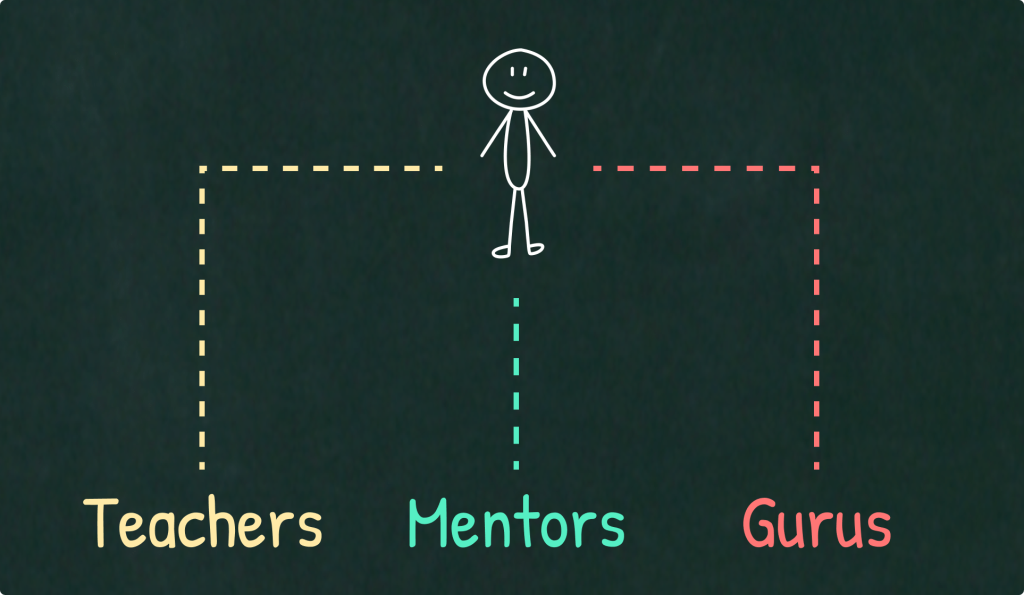
This essay will go through the differences. The importance of doing so is because the process of becoming a devoted follower of a guru (the worst outcome) is very subtle and often goes unnoticed — unless you understand what’s going on. It’s also important because you will understand what it means to be a great instructor and how to actually find one.
Gurus
A guru is someone who wants to convince you to follow him in all areas of your life. They tend to be intelligent and charismatic, and they cleverly leverage the social credibility of a skill (in which they have expertise) to then offer advice on all other areas of life.
For us to think that just because we made a lot of money, we’re going to be better at giving advice on every subject—well, that’s just crazy…I’m very suspect of the person who is very good at one business it also could be a good athlete or a good entertainer—who starts thinking they should tell the world how to behave on everything.
– Warren Buffet
[From the book – All I Want To Know Is Where I’m Going To Die So I’ll Never Go There: Buffett & Munger, by Peter Bevelin]
Why do some people follow gurus?
The most common reason is that it makes life much easier. Since the advice from the guru applies to all areas of your life, you don’t have to think hard again about pretty much anything! You can now only follow his life prescriptions and live a “good life,” at least their version of one.

Most people would rather die than think and many of them do!
– Bertrand Russell
But this is, of course, an illusion. Nobody has the answers for everything, and even under the assumption that someone has all the answers, you would be living constrained to their worldview and what they assign meaning to instead of living based on your belief and value system.
To go wrong in one’s own way is better than to go right in someone else’s.
– Fyodor Dostoevsky (Russian novelist)
[From his Novel – Crime and Punishment]
The fact that life has no meaning is a reason to live — moreover, the only one.
– Emil Cioran (Romanian philosopher)
This is the story of all human misery: Maximizing short-term comfort at the expense of long-term well-being. In this case, when we avoid the task of thinking hard about things that are important to us, such as how to live, we avoid short-term pain (thus, increasing short-term comfort), but in the long term, a life of philosophical imprisonment and self-suicide would await us!
The only person you are destined to become is the person you decide to be.
– Ralph Waldo Emmerson
The next reason why people follow gurus is their desire to belong to a group and the tribal thinking phenomenon that happens once they are in the group — which makes them obedient and devoted followers. Luckily, cults were much more prevalent in the past century; although in today’s world, our culture is increasingly more fragmented into niche groups or subcultures (due to the internet), barely any have the extremism and blinding effects of past cults. [Source: The Decline of Cults and the Rise of Subcultures]
How to avoid becoming a guru follower
People who follow gurus take their word as truth just because they say it. They don’t reason it through, and on top of that, the advice from the guru tends to cover all aspects of someone’s life. This can be catastrophic since you are applying all this unfiltered advice to all aspects of your life.
Don’t be a follower… Be a student! Take advice but not orders, take information but don’t let somebody order your life. Make sure what you do is the product of your own conclusion.
– Jim Rohn
[Video — How to Have the Best Year Ever!]
The key to breaking out of any kind of guru following is to break out of the follower behavior and instead become a student.
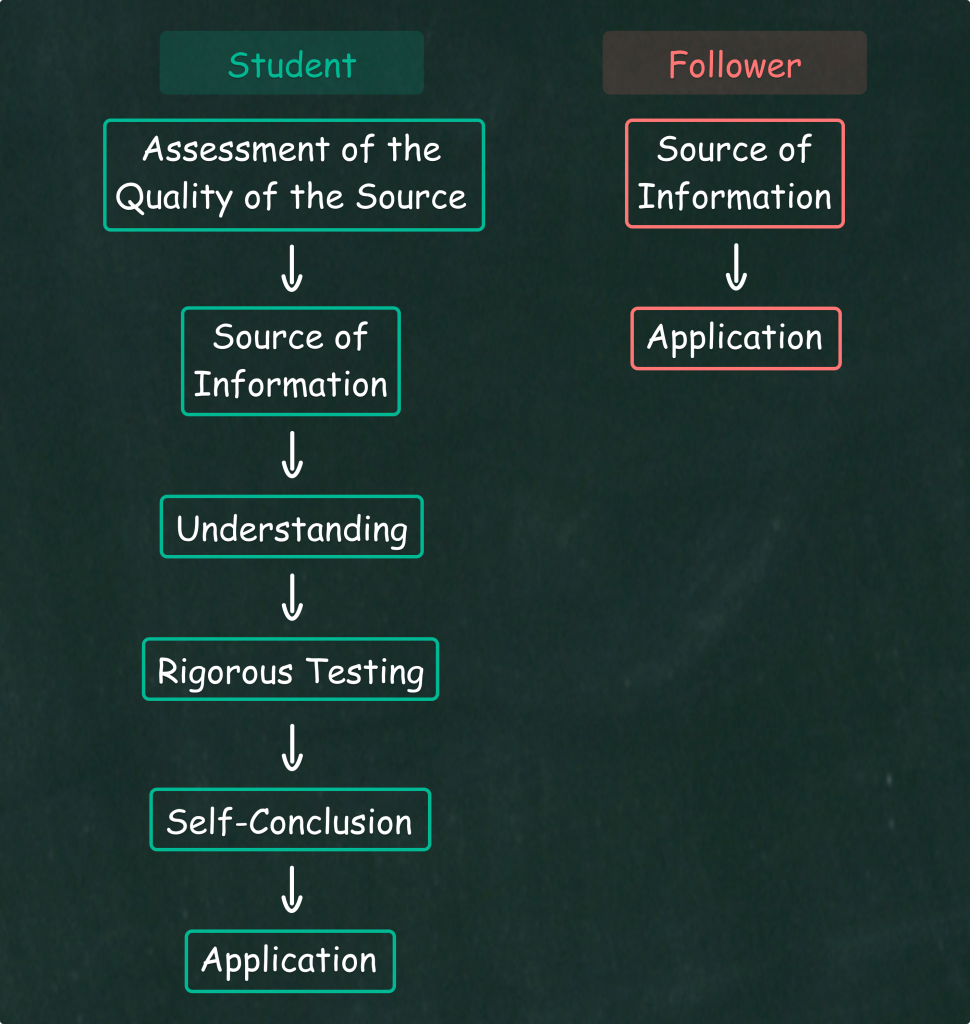
The Student Mindset
When you are a student, you consciously seek a particular subject or skill to learn from someone instead of the totality of areas in your life. And you seek to understand, not memorize or take their word at face value.
Now what I realize is that the biggest mistake was memorization — because when you’re actually trying to live your life in congruence with reality you want to have a deep understanding of what you do and why you do it… and so it’s much more important to know the basics really well than it is to know the advanced.
Knowing calculus wouldn’t help you today… it doesn’t help you in business doesn’t help you in most things… but knowing arithmetic will help you really—whether it’s at the corner grocery store counting change, to figuring out the value of your podcast business, to figuring out how to do the probability math on some action that you want to take.
So understanding basic mathematics cold is way more important than memorizing calculus concepts. And this is true of I think all reasoning—it’s much better to know the basics from the ground up (a solid foundation of understanding, a steel frame of understanding) than it is to just have a scaffolding where you are just memorizing advanced concepts. This is why there are a lot of people (I’m sure that you listen to) who are really smart, they use a lot of jargon and you can’t quite follow their reasoning… you don’t know how they’re putting things together and you have this deep down suspicion that they don’t even really understand.
So if you look at the most powerful thinkers—especially the ones where money or life is on the line—they have to understand the basics really really well…
Richard Feynman the physicist was able to… he had this piece in one of his lectures where he takes you from counting numbers on your hand all the way to calculus in four pages of text (orally, but written down is four pages of text) and it’s a complete unbroken logical chain that takes you through geometry, trigonometry, precalculus, analytic geometry, graphs, everything all the way to calculus. He understood numbers at a core level, he didn’t have to memorize anything! When you’re memorizing it’s an indication that you don’t understand, you should be able to re-derive anything on the spot and if you can’t you don’t know it.
– Naval Ravikant (Founder of AngelList)
A great analogy to this idea is the distinction between saplings and full-grown oaks:
The big trees have put down powerful, strong roots – they’ve done the hard work of penetrating the soil, looking for nutrients, fighting off animals that would crush them, surviving the storms, fires, etc. And having done so, it’s allowed them to flourish and grow tall (and catch more wind as a result). The saplings have the seed of the big tree to thank for their start – but they still have to do their own work, putting their own roots down. They cannot rely on the big tree to put down their own roots. They have to fight for their own survival, to put down their own roots. And the truth is, not all of them will make it.
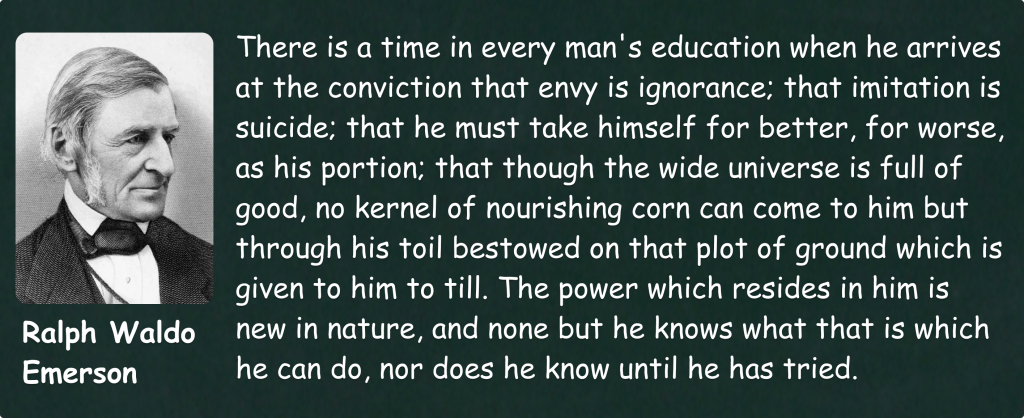
Similarly, an aspect of being a great student is that you don’t assess the truth of an idea based on the authoritativeness of the source but from your own self-reflection on it.
Remember: What you do should always be the product of your own conclusion. Here again, Naval Ravikant shows a great personal example when he integrated Buddhism into his life:
[Interviewer — Shane Parrish]:
You’ve kind of called your philosophy Rational Buddhism. How does that differ from traditional Buddhism? And what type of exploration did you go through to arrive at that?
[Naval Ravikant]:
Yeah, the rational part means that I have to reconcile it with science and evolution. And I have to reject all the pieces that I can’t verify for myself.
So for example…
– Is meditation good for you? Yes.
– Is clearing your mind a good thing? Yes.
– Is there a base layer of awareness kind of below your monkey mind? Yes.
All of these things I’ve verified for myself. And some of the beliefs that come out of Buddhism, I believe and follow, because again, I’ve verified or reasoned with thought experiments there myself.
But what I will not accept is things that are written down as just so. Like, “Oh, there’s a past life that you’re paying off the karma for…” Well, I haven’t seen it. I don’t remember any past lives, I don’t have any memory, so I just have to not believe that. Or when people say: “Your third chakra is opening and your second chakra is…” I don’t know. That’s just fancy nomenclature. I have not been able to verify or confirm any of that on my own.
So, if I can’t verify it on my own, or if I cannot get there through science, then… it may be true or false, but it’s not falsifiable — so I cannot view it as a fundamental truth.
On the other side, I do know that evolution is true. I do know that we are evolve, survival and replication machines. I do know that we have an ego — so that we get up off the ground and worms don’t eat us, we actually take action.
So, what Rational Buddhism means to me is understanding the internal work that Buddhism espouses, to make yourself happier and better off and more present, more in control of your emotions and being a better human being. But I don’t subscribe to anything fanciful just because it was written down in a book. I don’t think I can levitate. I don’t think that meditation is going to give me superpowers and those kinds of things.
So, try everything, test it for yourself, be skeptical, keep what’s useful and discard what’s not.
Another element of being a great student is choosing your source of knowledge wisely. At this point, we have learned to avoid gurus by becoming students rather than followers. But what about teachers and mentors? Which is better? And what’s the difference between the two?
Teachers
A teacher is anyone who is willing to share his knowledge on a specific topic or a particular skill. But he might or might not have earned that knowledge from real-world experience, that is, from being an actual practitioner. He might just have learned many theoretical concepts about the subject, and now he is teaching that to others. Even worse, he might not even understand what he is talking about because he has memorized all these ideas — he might have “chauffeur knowledge.”
I frequently tell the apocryphal story about how Max Planck, after he won the Nobel Prize, went around Germany giving the same standard lecture on the new quantum mechanics.
Over time, his chauffeur memorized the lecture and said, “Would you mind, Professor Planck, because it’s so boring to stay in our routine. [What if] I gave the lecture in Munich and you just sat in front wearing my chauffeur’s hat?” Planck said, “Why not?” And the chauffeur got up and gave this long lecture on quantum mechanics. After which a physics professor stood up and asked a perfectly ghastly question. The speaker said, “Well I’m surprised that in an advanced city like Munich I get such an elementary question. I’m going to ask my chauffeur to reply.”
– Charlie Munger (Ex-Vice Chairman of Berkshire Hathaway)
[Article – Two Types of Knowledge, by Shane Parrish]
The problem with teachers who only know the theory is that they believe that’s actually how the real world works. They are not aware of the limitations of their theories and their knowledge, which makes them dangerously overconfident.
In academia, there is no difference between academia & the real world.
— Nassim Nicholas Taleb (@nntaleb) September 30, 2017
In the real world, there is.
(inspired by Yogi Berra) https://t.co/Nsz9Il5QED
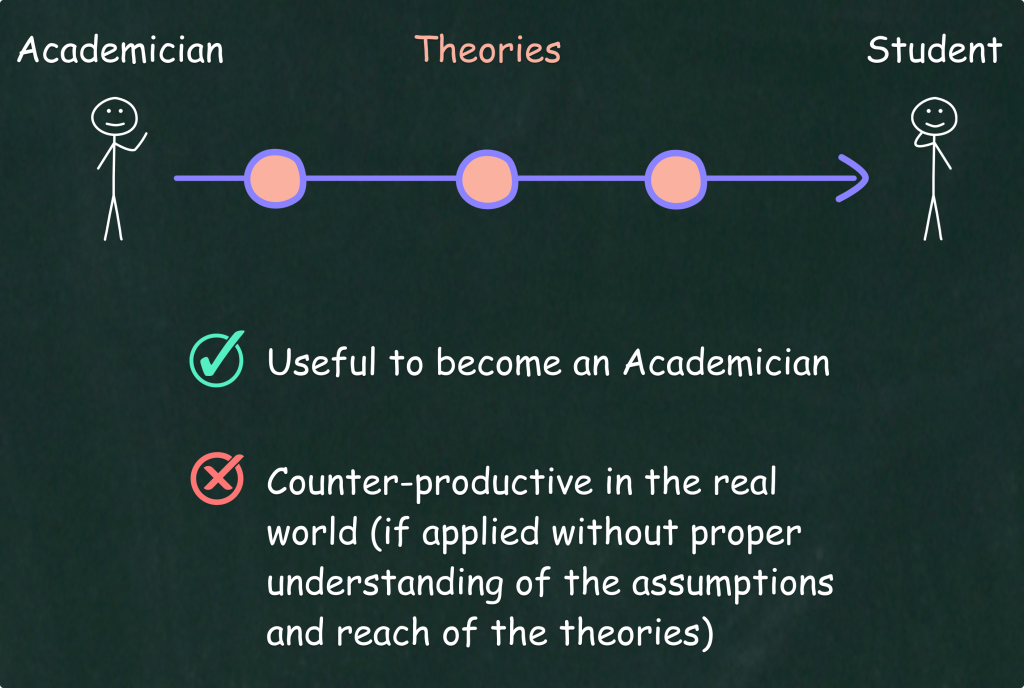
So, if you have to learn from someone who only has an academic background on the subject (almost all academics), it’s better to learn a subject that is easily verifiable — such as one of the hard sciences or math. But for other subjects that are not repeatable and verifiable according to your own experience, it’s wise to be cautious and pay special attention to the following:
1. Their “assumptions” — which are mostly made to make reality fit their models instead of making their models fit reality. The “Bed of Procrustes” is an excellent analogy for this:
Procrustes, in Greek mythology, was the cruel owner of a small estate in Corydalus in Attica, on the way between Athens and Eleusis, where the mystery rites were performed. Procrustes had a peculiar sense of hospitality: He abducted travelers, provided them with a generous dinner, then invited them to spend the night in a rather special bed. He wanted the bed to fit the traveler to perfection. Those who were too tall had their legs chopped off with a sharp hatchet; those who were too short were stretched (his name was said to be Damastes, or Polyphemon, but he was nicknamed Procrustes, which meant “the stretcher”).
– Nassim Nicholas Taleb (Author, Former Options Trader, and Risk Analyst)
[From his Book – The Bed of Procrustes]
2. Their neglect of “outliers” — things that are the exception to a theory.
The word “anomaly” I have always found interesting—what it means is something that the academicians could not explain. And rather than re-examine their theories they simply just discarded any evidence of that sort as “anomalous”. I mean… Columbus was an “anomaly”.
– Warren Buffet (Chairman of Berkshire Hathaway)
[Video — 1998 Berkshire Hathaway Annual Meeting]
Mentors
On the opposite end of the “teacher spectrum,” we have the teacher who has mastered the skill and has proved himself in the real world — that is, with regard to that particular skill. Just like Warren Buffet on investing or Richard Feynman on physics, he has an absolute mastery of the skill. Thus, he can teach as simply as possible (without the need for too much jargon), and he can perceive whether the student is actually understanding or just memorizing stuff. This person is a mentor.
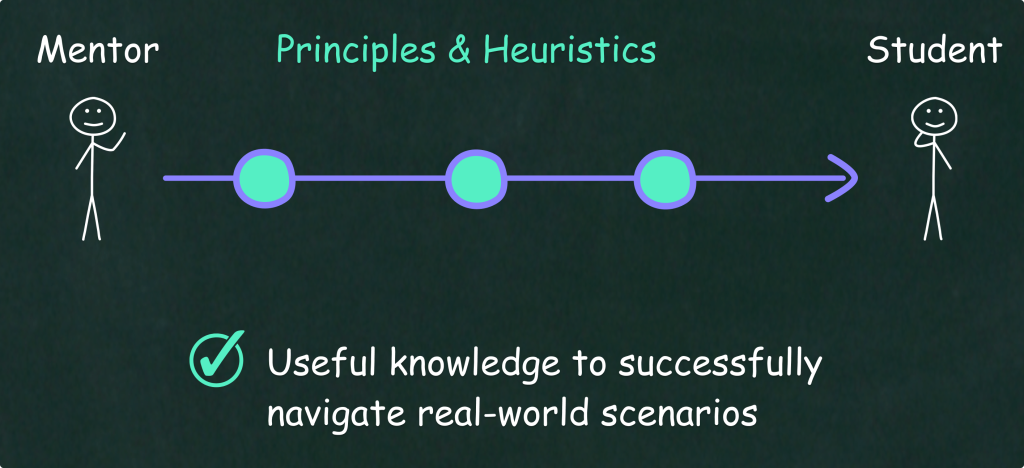
If you want to truly improve at a particular skill, the best thing you can do is associate yourself with a mentor.
Ryan Holiday is a great example of someone who understood the importance of having a mentor to craft his writing skills. He read every single book (and books from the bibliography) of the renowned author Robert Greene and then offered to become his Research Assistant for free! Sure enough, Ryan went on to become an influential author, too. [Book – The Daily Laws, by Robert Greene]
This might be an extreme example, but edge cases often help us see the truth of the matter. Of course, a mentor like Robert Greene is much more valuable than almost any college literature teacher! This is not just because Robert Greene has a proven track record of success as an author but also because he can teach things that are not commoditized. A college literature teacher will likely teach the same material as other college literature teachers — because, typically, there is a consensus over the imparted curriculum and subjects. However, an influential writer will have many ideas that are not conventional, and this can open up new perspectives and ideas for you.
[That’s] one thing you learn as a trader: anything you’re going to read in the newspaper—say the first 15 pages of the newspaper—is of absolutely no relevance to anything… It’s already “priced in”. It’s the same way to view [formal] education.
Apprenticeship—which is more tinkering, trial and error…—it’s vastly more important than [formal] education.
– Nassim Nicholas Taleb
[Video — 4 Rules To Become Antifragile]
My favorite tale on the importance of apprenticeships:
A Chinese boy who wanted to learn about jade went to study with a talented old teacher. This gentleman put a piece of the stone into the youth’s hand and told him to hold it tight. Then he began to talk of philosophy, men, women, the sun, and almost everything under it. After an hour he took back the stone and sent the boy home. The procedure was repeated for weeks. The boy became frustrated—when would he be told about jade?—but he was too polite to interrupt his venerable teacher.
Then one day when the old man put a stone into his hands, the boy cried out instantly, “That’s not jade!”
[Article – That’s Not Jade]
If you want a mentor, it’s not enough to ask for it, and you typically can’t pay them (or they are extremely expensive). As we saw with the example of Ryan Holiday, the single best way to get a mentor is to offer your time for free and help them in some area (where they actually need help). In the case of Ryan, he spent time and effort reading all of Greene’s books and the books he referenced even before interacting with him! So that when Robert would meet him, he would notice that Ryan would be helpful to him as a Research Assistant (and then giving his time working for “free”).
The mentor (or anyone) doesn’t owe you anything, so you must give something in return.
The mentor-apprentice relationship is a very mutually beneficial relationship. When you are in the inferior position and you are looking for a favor from someone who is powerful, you have to get outside of yourself and think of their needs. Obviously, mentors have a lot to give you. But, more important, you have to have something to give them.
– Robert Greene
[From his Book – The Daily Laws]
Summary Guide — Teachers vs. Mentors vs. Gurus
1. Avoid being a follower. Instead, be a student.
- A follower is someone who blindly accepts whatever idea some authority feeds him.
- A student is someone who takes ideas and advice but verifies them for himself to assess their truth. What he does is the product of his own conclusion. Moreover, he seeks to understand ideas rather than memorize them.
2. Be very selective when deciding whom to learn from. Understand that mentors (teachers with mastery of their skill) are an invaluable source of knowledge, whereas teachers with only an academic background are not particularly great (especially outside of Maths and Science).
3. To associate with a mentor, invest time and effort in meeting the mentor’s needs. You have to give value to get value in return.
If You Liked This Essay, Check Out These Sources
- All I Want To Know Is Where I’m Going To Die So I’ll Never Go There: Buffett & Munger, by Peter Bevelin
- Crime and Punishment, by Fyodor Dostoevsky
- The Decline of Cults and the Rise of Subcultures
- Jim Rohn – How to Have the Best Year Ever!
- Joe Rogan Experience #1309 – Naval Ravikant
- Wisdom vs. Knowledge: How To Guarantee Success In The Digital Age
- Correlation vs. Causation: The Danger of Misinterpreting Them
- Naval Ravikant on his Personal Philosophy – Rational Buddhism
- Two Types of Knowledge, by Shane Parrish
- The Bed of Procrustes, by Nassim Nicholas Taleb
- 1998 Berkshire Hathaway Annual Meeting
- The Daily Laws, by Robert Greene
- Nassim Taleb – 4 Rules To Become Antifragile
- That’s Not Jade
Mentorship Quotes: Wise Words of Guidance
In the dynamic journey of personal and professional development, the invaluable role of mentorship stands as a guiding force, offering insights, encouragement, and wisdom to those seeking to navigate the…